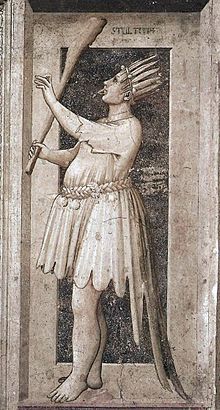
Back حماقة Arabic Torheit German Insensatez (vicio) Spanish Kepandiran ID 어리석음 Korean Stultitia Latin Foolishness SIMPLE Marrëzia Albanian 愚昧 Chinese

Foolishness is the inability or failure to act following reason due to lack of judgment, stupidity, stubbornness, etc.[1] The things such as impulsivity and/or influences may affect a person's ability to make reasonable decisions.[citation needed] Other reasons of apparent foolishness include naivety, gullibility, and credulity. Foolishness differs from stupidity, which is the lack of intelligence.[2] An act of foolishness is called folly. A person who is foolish is called a fool. The opposite of foolishness is prudence. [3]
- ^ American Heritage Dictionary of the English Language
- ^ Robert J. Sternberg (2003), "Smart People Are Not Stupid, But They Sure Can Be Foolish", Why Smart People Can Be So Stupid, Yale University Press, pp. 232 et seq, ISBN 9780300101706
- ^ Nathan Rosenstreich, "Prudence and Folly", American Philosophical Quarterly, vol. 22, issue 2, 1985, JSTOR 20014085, p. 93.